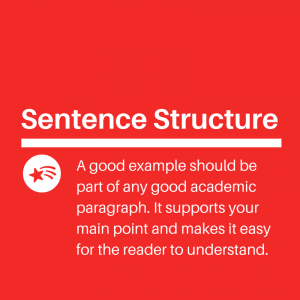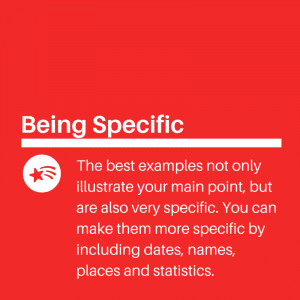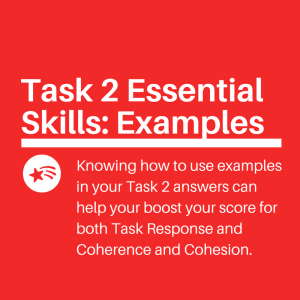Introduction
You should include at least 1 example in each main body paragraph in IELTS Writing Task 2.
If you look at the official Writing Task 2 Marking Criteria, you will notice that to get a Band 9, you must:
present a fully developed position in answer to the question with relevant, fully extended and well supported ideas
Paragraph Structure
A paragraph should have only one main idea to be easy to understand. A common mistake by IELTS students in Task 2 is thinking that if they include lots of ideas, they will get higher marks. In fact, the opposite is true. You get higher marks for developing your ideas with explanations and examples. You don’t get any extra marks for just listing lots of ideas.
Let’s look at an example question:
Today people are traveling more than before. Why is this the case?
Supporting Paragraph A
I think more people are traveling because people are earning more money these days and they can afford to travel. Additionally, flights are much cheaper than they were in the past. Moreover, people have very stressful lives these days and need to go on holiday. Furthermore, children expect to be taken on holiday when they are off school during the summer. Finally, it is good for the family to spend time with one another.
The person who wrote the above paragraph thinks that the way to get a high score is to list as many ideas as possible and show the examiner how much they know about the topic. This is actually one of the worst things you can do because Task 2 is not a test of your knowledge but your academic writing ability. The paragraph above is simply a list, not a coherent, cohesive paragraph that takes ideas and fully develops them.
Supporting Paragraph B
In the past, air tickets were only for the rich and famous because most salaries could not cover the price of a flight to a foreign country. This meant that the majority simply stayed at home or took their holidays domestically; however, this has all changed with the creation of budget airlines. Low-cost carriers, such as Ryanair in Europe or Tiger Air in Asia, have meant that anyone can save up and travel to a new country, with prices starting as low as $1.
The paragraph has only one main idea- that air travel is cheap. The author of this paragraph has stated their main point in the first sentence, then explained what this means and how it relates to the question and then used a specific example to illustrate their point. This is exactly what the examiners are looking for, and you should try to use the following structure to help you write your supporting paragraphs:
- Topic sentence (state your main point)
- Explanation (What does your main point mean? Why have you included it? How does it answer the question?)
- Example (A specific example that illustrates your main point)
Vocabulary
The following can be used to give examples:
- For example,
- For instance,
- This is illustrated by….
- …such as….
- ….namely….
You will notice that this is not a very long list. I have intentionally made it short for two reasons. You will only have time to include 2 or 3 examples in Task 2, and you already have enough new vocabulary to learn without trying to learn ten different ways to say ‘For example,’.
Below are some examples to show you how they are used in a sentence:
For example, thousands of Palestinians and Israelis have joined the same online groups that show support for peace and solidarity, something that would have been impossible 25 years ago.
For instance, most men and women who pay for an annual gym membership fail to go entirely after just one month.
This is illustrated by the fact that in the United States you must complete four years of higher education before you can study law.
Many sports brands, such as Adidas and Nike, pay professional athletes million of dollars to endorse their products.
There are now a few low cost airlines in the UK, namely Ryanair and Easyjet, that offer very affordable flights.
How to Think of Examples
The best way to think of examples is to consider how the question applies to your life experience.
Here are some things that should help you think of examples from your own life.
Let’s imagine that you are writing about the effect online businesses have had on traditional ‘bricks and mortar’ stores. Here are some examples I can use from my own life.
Your Country/City/Region
In Ireland, Amazon has forced many bookshops to close.
Your Job
There are a huge number of online IELTS schools competing with traditional schools.
Your Family
My family work in catering, so I could mention competition from online delivery companies, such as Deliveroo and Uber Eats.
Current Events
Companies like Zoom and Slack have revolutionised working from home.
As you can see, by thinking about your own life, you can generate real ideas.
Just be careful not to make them too personal, as this will not allow you to demonstrate the wider point.
Avoiding Generalisations
So now you know how to structure a paragraph and give examples, you need to avoid one of the most common mistakes students make when using examples- being too general. If you look at academic journals or books, you will notice that their examples are as specific as possible. This gives your points more authority and strengthens your arguments.
Below we will look at a question asking why women should receive equal pay. Our main point is that women achieve higher grades than men at university.
Let’s look at three examples:
1. For example, women achieve more than men at university.
This is a very general statement and does not really support our main point, and because it is so general, it sounds like we are just repeating the main point.
2. For instance, most women in my university course did better than men.
This is a little better because the author has been a little more specific about which university and which course, but there are no details, so it is still a little vague.
3. For example, at Queen’s University in 2009, 32% of female law graduates achieved First Class Honours, while only 8% of males achieved the same.
This is a specific example because it includes a time, place, and numbers. Think about it this way, if you were arguing with someone about this point and they gave you one of the three examples above, which one would you accept? By being as specific as possible, we can add weight to our argument and give a more academic answer.
You can make your example more specific by adding:
- dates
- place/business/university names
- names of people
- statistics
You don’t have to add all of these things; only one or two are required to make it more specific.
Next Steps
Go to our Writing Task 2 page, where you can find lots of sample answers, and each of them has very specific examples for you to compare. You can use practice using them in your essays. Here are over 100 real sample questions to get you started.







